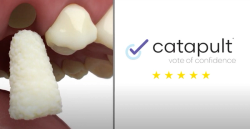- About Us
- Advertise
- Editorial
- Contact Us
- Terms and Conditions
- Privacy Policy
- Do Not Sell My Personal Information
© 2025 MJH Life Sciences™ and Dental Products Report. All rights reserved.
Character adjustment
Designed to recreate the internal effects and characteristics of natural teeth, Lite Art light-curing coloring pastes are highly fluorescent with low viscosities. Featuring a newly developed, multi-functional monomer and photo initiator, they deliver excellent surface covering qualities.
Designed to recreate the internal effects and characteristics of natural teeth, Lite Art light-curing coloring pastes are highly fluorescent with low viscosities. Featuring a newly developed, multi-functional monomer and photo initiator, they deliver excellent surface covering qualities.
With optimal covering properties, they can be applied nearly as thin as porcelain due to the microfine particle structure. Lite Art pastes cure nicely whether being used on resins, composites, artificial teeth or frameworks. Once applied it is easy to reproduce fine and specific natural internal accents by covering Lite Art with an incisal or translucent composite layer. The pastes are designed to reproduce the natural fluorescence of teeth even when exposed to artificial light conditions.
The system is designed with a novel coloring system that is actually based on custom mixing the classical primary colors of cyan, magenta and yellow. The three colors can be mixed in a wide range of combinations to create and match the exact natural colors needed for individual cases. Each of these primary colors can be used individually or mixed. However, 12 premixed colors imitating the color effects of natural teeth and pigmentation of the gingiva also are available, simplifying the mixing process. This means the system can be customized when needed, but also simple and ready to go when working on less complex cases.
The Lite Art pastes are an ideal way to add characterization and color modifications to restorations produced from composite or acrylic resins. They also can be used for modifying hard resin teeth and acrylic resin teeth. Here the procedure for using the Lite Art pastes for adjusting the shade of composite crown as well as for a hard resin denture tooth are outlined.
Composite crown shade adjustment
01 An individual occlusal internal effect is created via the application of a thin layer of the Orange Brown paste to the occlusal surface of the cured crown with a brush (Fig. A). Depending on the clinical case, Khaki colored paste or shade stains can be used to adjust the colors in interproximal and cervical areas.
02 The crown is light cured for 1 minute with the Solidlite V (Fig. B).
03 After curing, cover the stained surface with either incisal or transparent acrylic used to create the crown (Fig. C). In this case, Ceramage was used.
04 After curing once more, the restoration is finished and polished in the usual manner (Fig. D).
Artificial tooth shade adjustment
01 The surface of the denture tooth is roughened with a carborundum point (Fig. E).
02 Dust is removed from the surface using either a dry brush or a blast of compressed air.
03 Bond I of Cera Resin Bond is applied to the tooth and let set for 10 seconds (Fig. F).
04 Bond II of the Cera Resin Bond is then brushed on the tooth (Fig. G), and light cured for 3 minutes with the Solidlite V.
05 The A-Shade Lite Art paste is brushed onto the tooth surface (Fig. H) and then light cured for 1 minute.
06 Clear liquid is used to dilute the color and adjust the viscosity of the paste to achieve the desired effects (Fig. I).
07 The surface where the Lite Art paste was applied is covered with the Ceramage translucent T-Glass paste (Fig. J).
08 The final results are shown after the tooth has been finished and polished in the usual manner (Fig. K).



